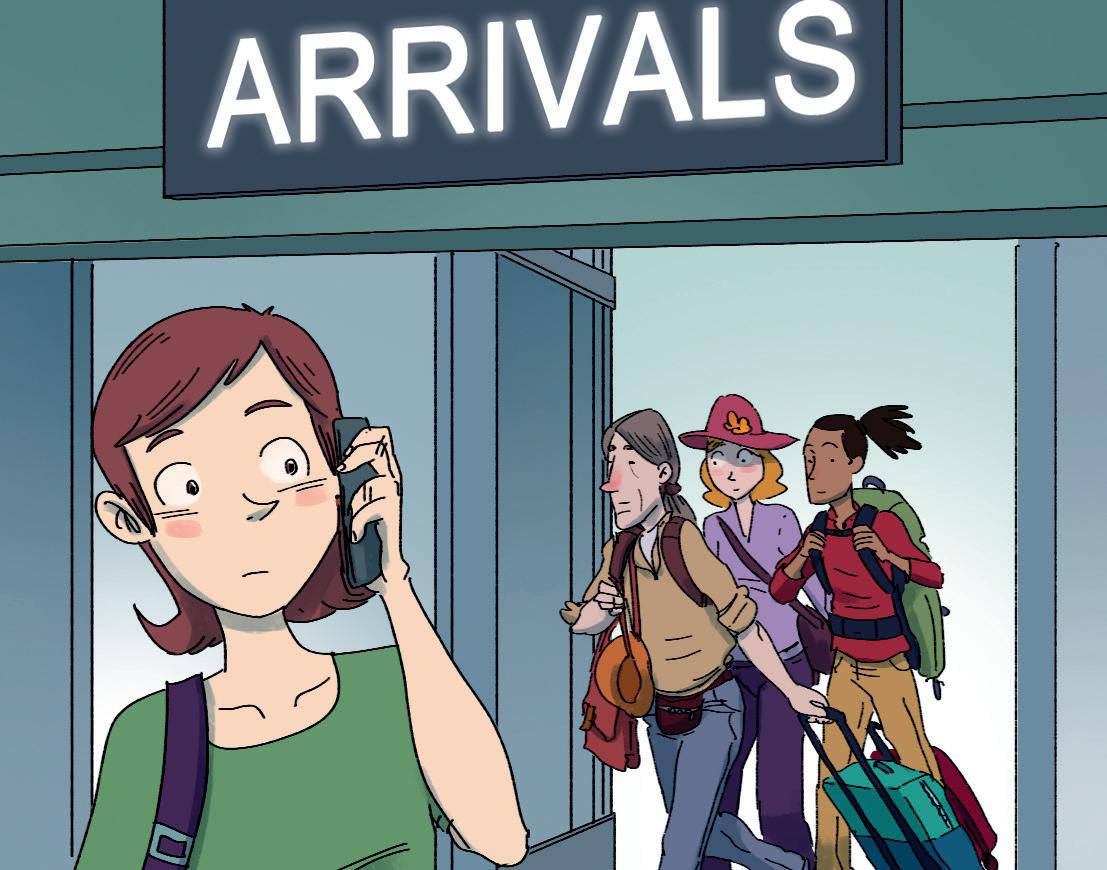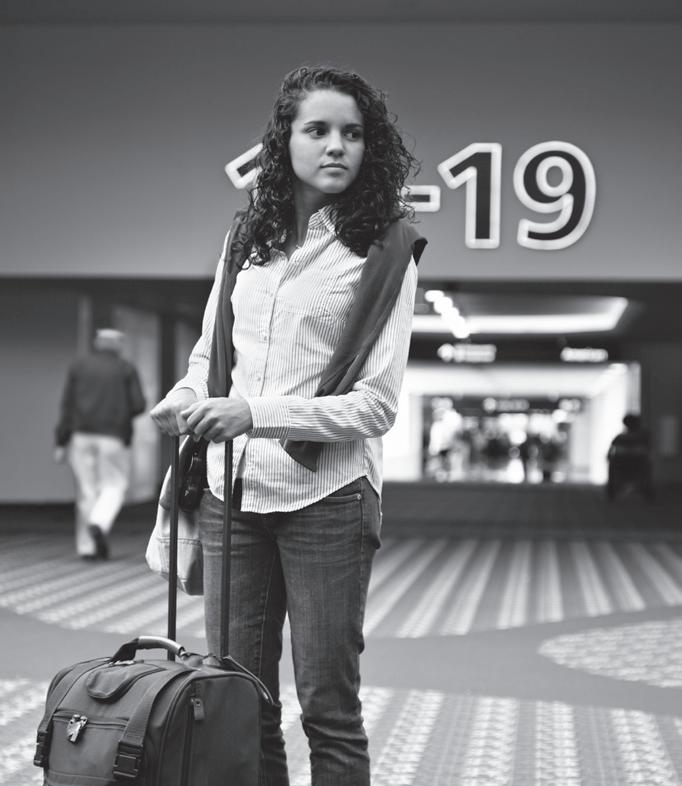COMPLETE
PRELIMINARY for Schools
Student’s Book without answers
B1
WITH ONLINE PRACTICE
Emma Heyderman and Peter May

Student’s Book without answers
B1
WITH ONLINE PRACTICE
Emma Heyderman and Peter May
Starting off
Feelings
Work in pairs.
• Look at the pictures. What do they show?













• Why? el?fe you make sturepic the do How Choose from these words.





sadness I cry a little bit



1 Your favourite football team has just lost a very important match. What do you do?




2 Somebody borrows a book from you but then loses it. What do you do?
3 You have broken a tooth, so you have to go to the dentist. How do you feel?
4 Your exam results are much better than you thought. What do you do?





5 Someone you don’t like wins a prize at school. What do you say to your friends?
Which nouns can we use to express the five adjectives from the box?

afraid – fear



Complete the headings in the quiz with nouns from Exercise 2.
Do the quiz. Make notes on your answers.


Work in groups. Compare your answers from Exercise 4.

Match the feelings from the box with definitions 1–6.
bored confident disappointed embarrassed grateful nervous
1 feeling or showing thanks grateful
2 unhappy because something wasn’t as good as you hoped, or didn’t happen
3 worried about something that will or might happen
4 sure that you can do something well
5 feeling ashamed or shy
6 unhappy because something isn’t interesting or you’ve got nothing to do
Look at the exam task below. Underline the key words in questions 1–6.
• Read each question to understand what the situation is. Decide what you have to listen for (e.g. a feeling or an opinion).
• You can change your mind about an answer when you listen again.
Listen to people talking in six different situations. For each question, choose the correct answer.
1 You will hear a young woman talking about taking part in a singing contest
After she finished singing, she felt
A confident about winning the competition.
B disappointed with her scores.
C embarrassed by her performance.
2 You will hear two friends talking about camping. The girl advises the boy to
A pack plenty of food.
B take some warm clothes.
C camp close to a lake.
3 You will hear a boy talking to his friend about a literature exam.
How does he feel?
A nervous about taking it
B bored of revising
C happy with his friend’s advice
4 You will hear a girl telling a friend about studying abroad.
Who did she have most fun with?
A other students on the course
B people in the town centre
C the family she stayed with
5 You will hear a boy telling his friend about how he travels to school.
Why has he decided to go by bike?
A to save some money
B to get more exercise
C to help reduce pollution
6 You will hear a girl talking to a friend about going shopping.
Who annoyed her yesterday?
A people who worked in the shop
B other customers in the shop
C pedestrians outside the shop
Listen again and check.
Work in pairs. What annoys you? Why?
Grammar can, could, might and may
Page
can, could, might, and may (ability and possibility)
Look at the underlined modal verbs for ability and possibility. Then answer the questions.
So, do you think you’ll try again in next year’s contest?
Yes, if I can. I might not win, but I think I could do better than this year.
1 Which modal verb is negative?
2 Where does not go?
3 What is the short form of cannot and could not?

4 What form of the verb goes after a modal verb?
Exam candidates often make mistakes with modal verbs. Underline and correct one mistake in each sentence.
1 We can to go to the cinema next weekend.
2 I know it may seems strange.
3 Sorry but tomorrow I’m not can go.
4 What we could do?
5 We can doing a lot of sports here.
6 It’s could be quite boring for you.
7 We could met at 8 o’clock near the cinema.
4
Read the message. Then complete the rules with the underlined words.
Hi Kylie, I’m sorry I couldn’t meet you yesterday and I don’t think I can go out on Thursday, either. I may be busy all evening on Friday, too, so Saturday might be better. There’s a new film on at the cinema. I don’t know much about it but it’s got our favourite actor in it, so it could be really good! Let me know what you think. Lauren
1 We use to talk about ability in the present and to talk about ability in the past.
2 We use , or for possibility in the present or future, with no real difference in meaning.
Choose the correct option in italics.

Work in groups.
1 How do teenagers in your country usually chat to each other? e.g. by phone, online messaging
2 What do they most often talk about? e.g. friends, sport
Listen to Rafael from Mexico and Lian from China talking about chatting to people. Complete the questions.

Hi Lauren, thanks for your message. I (1) might not / couldn’t reply to you earlier because I was in class. I (2) may / can see you’re very busy at the moment, so perhaps it (3) can / might be better to meet another weekend. It’s a shame we (4) can’t / may not see each other more often. You’re my best friend and I know I (5) might / can always tell you anything. I (6) could / couldn’t phone you in the next few days if you like. Love, Kylie
1 Student A: think of a place, then say what you can and can’t do there.
Student B: guess what the place is.
You can eat ice cream, you can’t arrive late, you can’t talk during the film ... The cinema!
2 Tell your partner about things you could, may, might or might not do next weekend.
I could go to the park, but I may just stay in and watch TV.
1 do you most enjoy chatting ?
2 do you chat?
3 can you chat people?
4 do you most like chatting ?
Listen again. Complete the questions they use to ask for each other’s opinion.

1 How you?
2 you?
3 What you?
4 Do you ?
5 What do you ?
• Take turns with your partner and try to speak for about the same length of time.
• Make the discussion longer by asking your partner for more information or about their opinions.
• Student A: ask your partner the questions from Exercise 2.
• Student B: answer the questions, using questions from Exercise 3 to take turns.

Page 126 Grammar reference Modal verbs: should, shouldn’t, ought to, must, mustn’t, have to, don’t have to (obligation and prohibition)
Look at the people in pictures A and B. Underline the modals used in the advice.
Complete the sentences using must, mustn’t, have to or don’t have to.
You ought to get a new T-shirt.


You shouldn’t go out tonight.
Read the rules. Then match pictures C–F with sentences 1–4.
1 You must wear this for the wedding. F
2 You have to be 14 to go on this.
3 You mustn’t make such a mess!
4 You don’t have to pay.
• Use have to when a rule or a law says it’s necessary to do something.
• Use don’t have to when it’s not necessary to do something.
• Use must when the speaker thinks it’s necessary to do something.
• Use mustn’t when you’re not allowed to do something.
don’t have to
1 It’s still early. We go home yet.
2 You look tired. You take a break.
3 It’s a secret. You tell her what I said.
4 Great, it’s a holiday! I get up early!
5 No, you can’t drive the car. You be 18!

Read these comments by students about school rules. Choose the correct option in italics.
1 ‘We shouldn’t / mustn’t use dictionaries during exams.’

2 ‘It’s a rule that we ought to / have to wear a uniform.’
3 ‘We don’t have to / mustn’t go to school on Saturdays.’
4 ‘Our teachers say we must / ought to always switch off our phones in class.’

5 ‘We shouldn’t / don’t have to make any noise in lessons.’
Work in pairs. Use modal verbs to say which sentences from Exercise 4 are true for your school.

We can use dictionaries in some exams.
We can’t in my school. We mustn’t use them in any exams.
1
Listen and repeat the sentences.
a I can buy another one.
b I can’t afford that one.
c I could meet you at 5.30.
d I couldn’t live without my phone!
e I should get up earlier on Sundays.
f I shouldn’t go to bed so late.
Listen again and answer the questions.

1 In which sentences is it easier to hear the modal verb? Do these sentences also contain not?

2 How is not written? Is it easy to hear this?
3 Which sentences have a weak form of the modal verb, which is not so easy to hear? Do these sentences also contain not?
Tell your partner about something you …
1 have to do at home.
2 mustn’t do at school.
3 don’t have to do at weekends.
4 must do this week.


5 shouldn’t do but sometimes do.
6 ought to do but probably won’t do.
Work in pairs. How do you feel when you have to do things other people tell you? Give examples.
I have to tidy my room every week.
Note: some adjectives can be followed by different prepositions with no change of meaning (Ivy was getting bored of/with the book. It was a red car, I’m sure of/about that). Others take one preposition for someone (She’s angry with Luca), but another for something (She’s angry about the late train).
Complete the questions with the correct prepositions. Then ask your partner the questions.
1 Is there anything in the news you feel sad ?
I feel annoyed with my parents when they tell me to eat things I don’t want to.

In the example above, with follows annoyed. In these sentences written by exam candidates, underline the preposition which comes after the adjective.
1 My father was very angry with me.
2 I never get tired of watching this film.
3 He was very sorry about what happened.
Complete the table with the prepositions about, of and with. Then think of more adjectives for each preposition and add them to the table.
afraid, ashamed, jealous, bored, fond
angry, disappointed, pleased, satisfied
sad, nervous, crazy, sure, depressed
Page 127 Grammar reference Adjectives with -ed and -ing endings

Quickly read the story. Do not complete the gaps at the moment.
1 Why did Leo ask the airline to help?

2 What happened in the end?
Look at this sentence. What - ing adjective does it use? How does the spelling change from the word in brackets?
For many people the flight from Europe to Australia is long and boring. (bore)
The sentence could be changed like this. What - ed adjective does it use? When do we use the - ing adjective and when do we use the - ed adjective?
Many people feel bored on the long flight from Europe to Australia.

Complete the text with the correct form of the adjectives in brackets. Use - ing if it describes something, or - ed if it tells us how someone feels.
Work in pairs.
Talk about the last time you were …
• surprised.
• tired.
• disappointed.
Now ask your partner to describe situations that were:
• exciting.
• interesting.
• embarrassing.
Write three pairs of sentences using the adjectives from gaps 2, 8 and 10 in the text.

For many people, the flight from Europe to Australia is long and (1) (bore). But it wasn’t for Abbie and Leo Davies –because that’s where they first met.
‘Abbie was sitting next to me,’ said Leo. ‘I felt (2) (relax) talking to her and we got on really well. We chatted all the way to Sydney and it was (3) (surprise) how quickly the time went.’
But they forgot to get each other’s phone number, so after the flight Leo contacted the airline. ‘To be honest, it was a bit (4) (embarrass) because the staff were quite (5) (amuse) by the situation, but anyway I gave them her seat number, and waited.’


Abbie, too, was feeling sad.
‘I was (6) (annoy) with myself for not getting his number,’ she said, ‘though I was also a bit (7) (disappoint) he didn’t ask me for mine. I thought he wasn’t really (8) (interest) in seeing me again. So I was (9) (amaze) when the airline phoned to ask if I wanted to call Leo. I was so (10) (excite) that I phoned him that evening, and soon we had our first date. Now we’re married and we’re very happy together.’
It’s relaxing to listen to music. I always feel relaxed when I play my favourite song.
Work in pairs.
1 Which of the things in the box are the most stressful?
bullying changing school diff iculty sleeping exams family problems moving to another city school work speaking in public
2 What other causes of stress are there?
3 What happens to people when they feel stressed?







Quickly read the article. What is the topic of each paragraph?

• Quickly read the main text. What is each paragraph about?

• Look at the ideas before and after each gap, then look for similar ideas in A–H.
• Look for words that often link ideas, for example this, then, do, also and however.
You are going to read an article about dealing with stress. Five sentences have been removed from the article. For each question, choose the correct answer. There are three extra sentences which you do not need to use.

A One I particularly like has a ‘quick tips’ section you can use in stressful situations.












B It was so funny that I felt more cheerful straight away.
C That made me realise I couldn’t go on feeling so stressed.

D I knew I had to finish that first.
E It recommended that everyone should laugh more often every day.
F So I took up dancing instead.
G People who do this often seem to be more miserable than everyone else.
H If it’s longer, I find it hard to get back into what I was concentrating on.
Work in pairs.
• Do you think an ‘anti-stress’ app could make you feel better? Why? / Why not?











• Which of the other ideas in the article might help you relax? Why?


• What other ways can you think of to deal with stress?
For months I’d been unable to relax and I felt awful. I worried about things, I wasn’t sleeping well and I couldn’t concentrate on my school exams revision. Then my best friend told me that everyone thought I was always in a bad mood. (1) C

I began by making some simple changes to my routine. Each morning when I woke up, I thought about things I was looking forward to, so that I started the day in a more positive mood. I kept doing that until it became a habit. I also knew I should do more exercise, but to tell the truth I don’t enjoy doing sports

(2) That really helped me to relax, particularly when I learnt to concentrate on enjoying the experience rather than let negative thoughts go through my mind.
I changed the way I study, too. I used to put off working as long as I could until finally I had to study for hours non-stop, often until late in the evening when I was getting really tired. Nowadays I try to do my homework straight after school and every 40 minutes or so, I take a break, usually for no more than ten minutes. (3)
I’ve also discovered some great anti-stress apps for my phone, such as Mindshift, Live Happy and Smiling Mind. Some of these are designed for teenagers, with yoga and breathing exercises to help you relax, a ‘book of happy memories’ that you create for yourself to look at when you’re feeling down, and relaxing sounds such as the ocean. (4) Some of these apps are free.
Last month I read an article which said people with a good sense of humour are usually happier and more relaxed.
(5) So watching cartoons or your favourite comedy series really can help you relax – and even make it easier to do your homework!
Match the adjectives in box A with their opposites in box B.
awful funny generous miserable ashamed nervous dull strange
cheerful spectacular fantastic mean ordinary proud relaxed serious
Work in pairs.
Tell your partner about something …
• strange that happened in a film you saw.
• fantastic that happened during the holidays.
• awful that happened at school.
• funny that you saw online or on TV.
Writing Part 2: A story
Page 150 Writing bank
story
Read this Writing Part 2 task and answer the questions.
• Your English teacher has asked you to write a story.
• Your story must begin with this sentence: Olivia read the message from her friend and smiled.
1 Are you given a first line?
2 Should you write in the first or the third person?
3 Which are the key words?
Read the example answer. Then answer the questions.
1 Where and when does most of the action happen?
2 Who are the main characters and what is their relationship?
3 What is the situation?
4 What problem do the characters have?
5 How is this problem solved?
6 How does the story end?

Olivia read the message from her friend and smiled. She was excited because Ellie, who lived abroad, was coming to visit her this Friday!
Just as Olivia reached the airport to pick up Ellie, she received a call. ‘There’s thick fog here and my plane can’t take off,’ explained Ellie. ‘I’m not sure what’ll happen.’
‘I’m really disappointed,’ replied Olivia.
As Olivia waited at the airport, she became quite miserable. But then, Ellie called again. ‘The sky’s cleared!’ she said. Three hours later Olivia was delighted when Ellie’s flight had finally landed. Ellie said, ‘It’s fantastic to see you!’

Read the story again. Find four adjectives that describe how Olivia felt.
Read this Writing Part 2 task and answer the questions from Exercise 1.
• Your English teacher has asked you to write a story.
• Your story must begin with this sentence: Matthew felt excited as he waited for the train.
Think about the questions from Exercise 2 and plan your story.
• Decide where and when to set your story.
• Plan the main events and think about the kind of person your main character is.
• Try to make your story interesting for your readers.
Write your story in about 100 words.
Choose the correct option in italics.
1 The team was cheerful / disappointed when they lost the match by one point.

2 I was jealous / embarrassed when my brother got a new tennis racket and I didn’t.
3 Isabelle never lends me anything, not even a pencil! She’s so serious / mean.
4 Callum always sleeps with the light on, otherwise he feels afraid / miserable that something bad will happen.
5 I felt so embarrassed / strange when I forgot the words I had to say in the play.
6 I’m very fond / bored of my great-aunt Lily. She’s so kind.
7 It was the first time I had to play the piano in public, so I was feeling confident / nervous.
8 Ethan felt satisfied / ashamed when his friend discovered he was lying.
Complete the sentences with an adjective from the box and a preposition. Sometimes more than one answer is possible.
afraid angry ashamed bored crazy depressed pleased sure
1 Poppy was her sister when she borrowed her best dress without asking.
2 My cousin is spiders and runs away when he sees one.
3 We were watching TV all afternoon, so we turned it off and went to the park.
4 You should be your behaviour. It’s terrible to upset someone like that!
5 Charlie’s parents were him when he won first prize.
6 I don’t enjoy football any more. I’m getting always being in the bottom team.
7 Are you the time the train leaves? Just check it again.
8 Jake is reggae music and listens to it all the time.
Correct the adjectives in bold with an adjective from the box with the opposite meaning.
complicated fantastic funny generous miserable ordinary positive relaxed
1 My brother is very mean. He always lets me borrow his things if I need them.
2 I was feeling cheerful because I missed the party and I really wanted to go.
3 Josh was so serious that I couldn’t stop laughing.
4 Jessie’s instructions were so simple that I couldn’t do the activity.
5 The film was absolutely awful . I can’t wait to see it again!
6 I love Lucy. She has such a negative attitude to life, even when things go wrong.
7 Lydia is feeling nervous now that she’s on holiday.
8 It was a very strange day – I got up, went to school, came home and went to bed, as usual.
Complete the sentences with the correct form of the words in brackets.
1 (bore)
a The long train journey was .
b Sean was because he had nothing to do.
2 (embarrass)
a It was really when I fell over in the street.
b I felt because I wore the wrong clothes to the party.
3 (relax)
a Sitting on the beach with a good book is .
b I feel when I listen to music.
4 (excite)
a My friends are about the skiing trip.
b The action film was really
5 (amuse)
a Rachel laughed because the video clip was very .
b My grandfather was when he heard the joke.
• Decide which sentences are definitely wrong and then try to find evidence that shows why one of the remaining ones is right.
• Think about the grammar of the sentence. Do the pronouns in the options match the sentences before and after the gap – singular/plural, male/female, etc.?
Read the text about going to learn a language abroad. Did the writer enjoy the experience?

Five sentences have been removed from the text.
For each question, choose the correct answer. There are three extra sentences which you do not need to use.
Finally the big day arrived. I was going on an exchange trip to stay with a French family. I was feeling nervous and excited because this was my first time on a plane and my first time travelling alone, without my parents. (1) . We met Emily at the airport, a couple of hours before the flight.
The flight was fine, although it was strange seeing the city disappearing under me from so high up. The flight went by quickly because I was so busy chatting to Emily about our trip and how our different host families might be. During the flight, we decided that we shouldn’t spend time together speaking in English during our month abroad. (2) . Despite our agreement, I was worried that I wouldn’t be able to say much the whole time I was in France. However, when my host family met me, I knew from the mother’s warm smile that everything would be OK.
It was still a bit stressful at first, trying to understand and communicate, but after a couple of weeks it became easier. I spent a lot of time with the two teenagers in the family. (3) In fact, I learnt loads of interesting words from them, you know, the kind of things you don’t find in books! I had one embarrassing moment when I used the wrong word when I was talking to their grandmother, but she was very relaxed about it. (4)
When the time came to say goodbye to my host family, I was very sad to leave. However, I have brought back some wonderful memories from this experience. The most important thing I’ve learnt is that if you’re open and positive about learning a language, then it’s much easier. (5) I’ve even started watching a television series in French and I’m surprised to find that I can understand a lot more than before my stay in France.
A After all, you can’t expect a language student to get everything right!
B I’ve come back relaxed and much more confident in my ability.
C I’ve paid attention to them and worked hard to do well.
D Otherwise we wouldn’t learn as much French.
E I found it disappointing when I didn’t understand.
F They didn’t have time to show me much.
G Luckily, another girl from my class was going as well.
H They were younger than me but we got on well.
• You will hear information related to all three options. The answer can be heard at the beginning, in the middle or at the end of the conversation. Don’t just tick the first thing you hear and then stop listening.
• Check your answer the second time you hear the conversation.
For each question, choose the correct answer.
1 You will hear two friends talking about a sports centre. They agree that
A the staff are welcoming.
B the prices are reasonable.
C it is well organised.
2 You will hear a girl talking to a friend about moving home.
How does she feel about it?
A disappointed with the size of the house
B pleased with the public transport in the area
C worried about losing contact with her friends
3 You will hear a boy talking to a friend about a website. He thinks it is good because
A students can use the photos on the site.
B it has all the information they need.
C it’s easy to use.
Choose the correct option in italics.
1 When my grandad was younger, he can / could see very well but now he’s old, he can’t / couldn’t read without glasses.
2 I’m not sure if I can / may finish this work today. I can / might have to do it tomorrow.
3 A: Where’s Katie? I can’t / couldn’t find her.
B: She can / might be in the playground. I saw her going in that direction a few minutes ago.
4 The football match can / may be cancelled because it might not / might snow this weekend.
5 A: Can / May you play the piano?
B: No, but my brother can / might play very well.
4 You will hear a boy talking to his mother about a basketball match.
The boy is unhappy about the match because
A he didn’t play well.
B he didn’t play much.
C his team didn’t win.

5 You will hear a girl telling a friend about a board game. She found it boring because
A the other players knew more about the game than she did.
B she had to wait a long time for her turn.
C no one wanted to talk while they were playing.
6 You will hear two friends talking about a party. The girl enjoyed the evening because
A she got to know new people.
B everyone was dancing.
C she had an interesting conversation.
Choose the correct option in italics.
1 You shouldn’t / don’t have to go to bed late when you have to get up early the next day.
2 You mustn’t / have to lie to people if you want to stay friends with them.
3 You shouldn’t / have to pay if you break something in a shop.
4 You ought to / shouldn’t eat vegetables every day to be healthy.
5 You should / don’t have to bring food for the trip. Lunch will be provided.
6 We don’t have to / must turn off the lights when we’re out, to save electricity.
• Remember you should spend about 20 minutes writing your story. In this time you need to plan the story, write it and check it.
• Try not to repeat verbs and adjectives. Think of other words that mean the same but are more interesting.
• Don’t write too many words over the limit – if you write too much, you are more likely to make mistakes.
Read the exam question. The words and phrases in the box show ideas you could use in this story. Put them into the correct part of the table.
Your English teacher has asked you to write a story. Your story must begin with this sentence. It was a day when everything went wrong.
angry at school miserable on holiday I lost something sad my brother nervous a teacher a shop assistant at home I forgot something my family depressed I missed the bus/train a police off icer embarrassed a friend disappointed at a sports match I broke something
Place(s)
People
Problem(s)
Read the answer below and number the events
A–E in order. Ignore the gaps in the story.
A I ran to the school.
B I arrived at the sports centre. 1
C All the other people thought I looked funny.
D I called my friend.
E I couldn’t find my boot.
Feelings
It was a day when everything went wrong. It was Saturday. I was feeling excited and

(1) because I had an important match that morning. I went to the sports centre early, but it was empty. The man at the door said, ‘There isn’t a match here today.’ I phoned my best friend. He was (2) and said, ‘Where are you? The match starts in fifteen minutes.’ Then, I remembered that the match was at school. I ran as fast as I could. When I arrived, the teams were already playing. I went to change and saw that I only had one boot. I couldn’t find the other one, so I went out to play with one boot and one shoe. Everyone laughed and I felt really (3) .

Complete the story with interesting adjectives.
Now answer this exam task.
Your English teacher has asked you to write a story. Your story must begin with this sentence. It was the day I met my hero.
Write your story in about 100 words. Think about the place, time, people and feelings.
WITH DOWNLOADABLE RESOURCE PACK
Unit objectives
Listening Part 2: multiple-choice short dialogues: listening for facts, opinions or feelings
Reading Part 4: text insertion: identifying the topic of a paragraph; identifying linking words (this , then , do, also, however, etc.)
Speaking Part 4: general discussion; describing personal experiences; asking people what they think
Writing Part 2: A story: using adjectives to describe a feeling
Grammar: can , could , might and may (ability and possibility); should , shouldn’t, ought to, must, mustn’t, have to and don’t have to (advice, obligation and prohibition)
Vocabulary: feelings; adjectives and prepositions; adjectives with - ed and - ing ; adjectives of emotion and their opposites
Pronunciation: modal verbs: weak and strong forms
Lead-in
Write feelings on the board and elicit words to describe someone’s feelings, e.g. happy, sad, tired. Students work in groups of four. Elicit adjectives from the groups but don’t ask who they referred to.
1 Elicit a definition of jealous (unhappy and angry because you want something that someone else has). Point out that different pictures will elicit different feelings from different people. Ask students to explain why they feel the emotions they do, e.g. Picture 1 makes me happy because it brings back good memories
2 To help students, you could say that the nouns for the other four words end in - er, -ess and -y. Elicit the answers and check how students could use both adjectives and nouns in sentences, e.g. I am afraid of spiders. / I have a fear of spiders.
Answers angry–anger; happy–happiness; jealous–jealousy; sad–sadness
3 Elicit from students that they are only completing the missing noun at this stage, not what they would do in this situation. Students should work alone as there is no correct answer.
Suggested answers
2 Anger 3 Fear 4 Happiness 5 Jealousy
4 Look at the example and elicit what other people may do, e.g. someone might forget about it very quickly. Set a time limit of two minutes for students to complete their responses alone.
Suggested answers
2 say nothing to them / tell them it’s OK / shout at them
3 a bit nervous / absolutely terrified / completely relaxed
4 you laugh and jump around / you smile a little / you continue working
5 you say they’re very lucky / you say they don’t deserve it / you take no notice and say nothing
5 Before students work in groups, check emotional–unemotional. Elicit how an emotional person differs from an unemotional one.
1 Allow students to work in pairs to do the matching. Elicit the answers and ask students for examples of feeling these emotions.
Answers
2 disappointed
5 embarrassed 6 bored
2 Look at question 1 and elicit the key words and why they are important, e.g. young woman – shows you who is speaking, singing contest – shows what is happening, after – shows when we are interested in, she felt – this shows us what we are listening for. Students do the same with 2–6 in pairs. Elicit the key words in each of the other questions and how they help us.
Answers
1 how a woman felt after a singing contest
2 the advice that the girl gives the boy
3 how the boy feels
4 who a girl had most fun with
5 the reason a boy decided to go to school by bike
6 who annoyed the girl yesterday
Discuss the advice with the students and ask them why they think it is useful (they now have a clear idea of what they are listening out for ). Re-elicit the advice from previous units that students hand in a separate answer sheet so their corrections won’t be seen by the examiners.
3 Tell students to work alone and not to compare answers between listening. This is not the first time they have looked at this type of listening and they should get used to working under exam conditions.
4 When students have listened a second time, allow them to compare their answers in pairs and try to remember what was said on the recording to help them choose the answers. If there is time, photocopy the audioscript so that students can find the part of the text with the correct answer and why the other two options are wrong.
Answers 1
Track 24
1
Narrator: You will hear a young woman talking about taking part in a singing contest.
Man: What did you think of the judges’ scores?
Woman: Well, I thought I’d sung pretty well, certainly nothing to be ashamed of, but I must admit they were lower than I’d expected. I knew then that I had little chance of beating the others, but at least I’d done my best. For me that’s the most important thing.
Man: Yes, definitely. So do you think you’ll try again in next year’s contest?
Woman: Yes, if I can. I might not win but I think I could do better than this year.
Narrator: You will hear two friends talking about camping.
Boy: I’m going camping in the mountains on Friday.
Girl: That’ll be great fun, especially with the hot weather we’re having right now, but the temperatures there can really drop at night, even in summer. You’d better put a jacket and a thick sweater in your backpack instead of lots of things to eat. You can always get a tasty meal in one of the local villages. Where exactly will you be going?
Boy: Up by the lake.
Girl: It’s beautiful there, isn’t it? But perhaps it’d be best to put your tent up somewhere else. At this time of year the mosquitoes there are awful. They never stop biting!
Narrator: You will hear a boy talking to his friend about a literature exam.
Girl: You’ve got that literature exam next week, haven’t you? How’s the revision going?
Boy: I thought I’d be getting tired of it by now, but your suggestion that I should watch films of the books we have to study has made it more interesting and I understand the stories better. Usually just before an important exam like this one I feel really worried about what could go wrong on the day: this time’s quite different, though.
Girl: That’s great to hear. I’m sure you’ll do really well on Monday morning. Good luck!
4
Narrator: You will hear a girl telling a friend about studying abroad.
Boy: Did you enjoy your month abroad?
Girl: Yes, I was in a small town in the countryside. The lessons were good even though the rest of the class were younger than me and we didn’t have much in common. I had a lovely room in the house where I was staying. The couple I was staying with were kind to me but they had a busy social life and I hardly saw them. So I went to the main square where all the shops and cafés are and made friends there. We had a great time hanging out and chatting.
5
Narrator: You will hear a boy telling his friend about how he travels to school.
Girl: I see you’re using your bike every day now, instead of coming to school in your mum’s car.
Boy: Yes, I’ve been doing that since the beginning of term. Actually, she still goes right past school on her way to work, so it’s not about protecting the environment, spending less on petrol or anything like that. It’s just that I realised I was spending nearly all my time sitting down, in class and at home, and I thought I’d better do something about it.
Girl: That’s a good idea. Maybe I should do the same.
6
Narrator: You will hear a girl talking to a friend about going shopping.
Boy: So how was your shopping trip yesterday? I imagine the city centre’s pretty crowded on a Saturday morning at this time of the year.
Girl: Yes, there were lots of people walking in the streets and the department store was full of customers, too. I don’t mind that, but I wasn’t happy about having shop assistants trying to sell me stuff when all I wanted to do was look at things on the shelves. I noticed they were bothering other customers, too. If they carry on like that their shop won’t be full much longer.
5 It might be a good idea to elicit some ideas from the class to give everyone some ideas. Note key words on the board depending on what the students say, e.g. borrowing, arguing, rules, brother. When students have finished, put them into groups of four to discuss their ideas. Elicit ideas from each group.
Workbook page 22
Grammar SB page 45 can , could , might and may
Lead-in
Put students into groups of four and ask them to write two questions: one about ability starting: Can you …? and one about a possibility starting: Could there / it be …? They ask each other the questions. Elicit ideas from each group.
1 Allow students to work in pairs. When they have finished, give them more rules about modal verbs: modals always have the same form; there is no third person -s; we form questions by reversing the order of the modal and the subject: I can – Can I? Abbreviated forms: will not – won’t, shall not – shan’t.
Answers
1 might not 2 ‘not’ goes after the modal verb
3 can’t and couldn’t 4 the infinitive without to
2 Allow students to work in pairs. When they have completed the sentences, elicit which rules they illustrate: 1, 2, 5, 7 – they are followed by the base form without to; 3 – not comes after the modal verb in negatives, we don’t use the verb to be before a modal;
4 we reverse the word order in questions; 6 we don’t use the verb to be before a modal.
Answers
1 We can to go to the cinema next weekend.
2 I know it may seems seem strange.
3 Sorry but tomorrow I’m not can can’t go.
4 What we could could we do?
5 We can doing do a lot of sports here.
6 It’s It could be quite boring for you.
7 We could met meet at 8 o’clock near the cinema.
3 Allow students to work in pairs. Elicit the answers and point out that we can’t use couldn’t for a present or future possibility, e.g. We might not meet later. √ We could not meet later. x
Answers
1 can, could 2 may, might, could
4 Look at the example with students and ask why couldn’t is the correct choice (It is about a negative past ability). Students work alone and then compare their answers in pairs. If there are any differences of opinion, they should try to decide which answer is correct and why.
Answers
2 can 3 might 4 can’t 5 can 6 could
Students could do Grammar reference: Modal verbs: can, could, might and may (ability and possibility), Exercises 1 and 2, page 126, for homework.
5 Look at the example and point out that eating ice cream is popular in British cinemas and theatres. Set a time limit of two minutes for each activity and then elicit ideas from the class.
Point out that we often use the modal of ability from this lesson when chatting with friends, e.g. Do you want to meet later?
Students work in pairs to think of two similar dialogues with one question and one response in each.
Grammar reference page 126 Modal verbs: can, could, might and may (ability and possibility) Workbook page 22
1 Students stay in the same groups to discuss the answer. Set a two-minute time limit and elicit ideas from each group. Ask students if they can remember the topic of the last thing they talked to a friend about.
2 Look at the questions with the students before they listen and ask what the missing words could be.
Answers
1 Who, to 2 How, usually 3 When, to 4 What, about
Rafael: Who do you most enjoy chatting to?
Lian: To my friends. Especially my best friend Jia, who goes to a different school from me. We always have so much to say to each other! How about you?
Rafael: Yes, to friends too. And also to my cousin Antonio. He’s about the same age as me and we get on really well so we spend a lot of time talking to each other. How do you usually chat? By phone?
Lian: Quite often, but sometimes we text. Especially when it’s difficult to talk aloud, for instance if I’m in the library. And you?
Rafael: Mostly on Instagram, if I’ve got an internet connection of course. And it doesn’t cost anything to post messages, which is great. I can’t do that at school, though. When can you chat to people?
Lian: In the evenings, mainly. After I finish my homework and I can relax. I think that’s the best time. What about you?
Rafael: Oh, I can’t wait that long. I check my messages and reply as soon as I get out of school! It’s usually to make plans for the evening or just to catch up with what’s going on. What do you most like chatting about?
Lian: Sorry, could you say that again?
Rafael: Sure. What do you most like chatting about?
Lian: Well, Jia and I often give each other advice. For example if I’m worried about something, I ask her what I should or shouldn’t do and she might tell me what I could do. I think that’s very important. Do you agree?
Rafael: Yes, I do. That’s what friends are for. But other times they tell me about something funny that’s happened and we laugh and I think that’s good too. What do you think?
Lian: Oh yes, definitely. It’s not good to be serious all the time!
3 Again, encourage the students to read the expressions before they listen. Remind them that they should always read through questions before they start listening to the recording so that they know what they are listening for.
Answers
1 about 2 And 3 about 4 agree 5 think
Discuss the advice with the students and ask why it’s important:
1 Speaking for the right length of time is fair and shows that you are interested in what the other person has to say.
2 This helps both students. The one asking the questions shows that they have good English skills and the one being asked has the chance to reply and show off their own ability.
4 Once students have practised in pairs, put them in groups of three and ask one student to act as the examiner.
Speaking bank pages 162: Part 4
Grammar SB page 47
Lead-in
Tell students you are going to ask three questions and that, for each one, they should write the first person they think of. Ask: Who do you ask if you need help deciding what to wear, do or buy? Who often tells you what you must do? Who often tells you what you mustn’t do?
When students have written their three answers, put them in groups of four to tell each other what they wrote and give examples
1 Elicit the modal verbs they learned before (can, could, may, might) and some of the rules for using them, e.g. they are followed by the infinitive without to. When students have finished, point out that ought to is also followed by the bare infinitive. Elicit the negative form of ought to (ought not to).
Answers ought to, shouldn’t
2 When students have finished the activity, give an example of the difference between must and have to, e.g. I must get my hair cut (it looks a mess). I have to get my hair cut (my parents told me to). Elicit that the negative form of have to is don’t have to / doesn’t have to.
Answers
2 E 3 C 4 D
3 Students work alone and compare their answers in pairs. Point out that in sentences such as 2, we could use must or should with little difference in meaning. Sometimes, this is called strong advice. Elicit some examples: You must go to see the new superheroes film at the cinema. It’s amazing.
Answers
2 must 3 mustn’t 4 don’t have to 5 have to
Students could do the Grammar reference: Modal verbs: should, shouldn’t, must, mustn’t, have to, don’t have to (obligation and prohibition); Exercises 1 and 2, pages 126–127, at this point or for homework.
4 Students work alone and compare their answers in pairs. Elicit why each answer is correct (1, 2, 4 are rules; 3 isn’t necessary; 5 is a rule but the use of shouldn’t rather than mustn’t shows that the speaker thinks it is a rule which is sometimes broken).
Answers
2 have to 3 don’t have to 4 must 5 shouldn’t
5 Set a time limit of two minutes for students to discuss the sentences. Elicit their ideas and, if any are different from their school, ask which they think is better, the school in the exercise or their own. Why? You could also ask the students which of these rules they think are fair and unfair and why.
Extension idea
Put students into groups of four. Set a time limit of three minutes and ask each group to write more rules that they have to follow at school. Elicit sentences from different groups.
6 When students have repeated the full sentences, model and drill the individual modals as well. Model and drill the schwa sound. Ask students why negative modals are said more clearly than positive ones (in a positive sentence, the important information is in the main verb but in a negative one, the important information is that you can’t/mustn’t/shouldn’t do the action of the main verb).
Track 26
a I can buy another one.
b I can’t afford that one.
c I could meet you at 5.30.
d I couldn’t live without my phone!
e I should get up earlier on Sundays.
f I shouldn’t go to bed so late.
7 Play the recording again, then go through the questions with the class.
8 Before the students start, ask them to look at sentences 1 and 4 and elicit what the difference between them is (1 is a rule from someone else; 4 is something the student themselves think is a necessity). When students have finished, ask them what the most interesting fact they found out from their partner was. When they talk about their partner, elicit they need to say has to / doesn’t have to
Grammar reference pages 126–127: Modal verbs: should, shouldn’t, must, mustn’t, have to and don’t have to (obligation and prohibition)
Workbook page 22
Lead-in
Elicit one or two adjectives of feeling from the class, e.g. happy, tired. Put students into groups of four and set a time limit of one minute for each group to think of as many adjectives of feeling as they can. Tell the groups they are going to take turns to say one of their adjectives and the group that can continue for the longest wins. Start by saying: I’m happy
1 Tell students to think of their reactions to different people, e.g. a parent, a teacher, a friend, a brother or sister as they might feel differently for each. Set a time limit of two minutes and then elicit ideas.
2 When the students have finished, elicit how these prepositions can be tested in the exam, e.g. students’ writing, multiple-choice gap fill, open cloze gap fill.
Answers 1 with 2 of 3 about
3 Set a time limit of two minutes, then elicit ideas and write them on the board for all students to make a written record of, e.g. tired of, proud of, worried about, happy about/with, annoyed about/with.
Answers 1 of 2 with 3 about
4 Before students look at the questions, look at the photos with the class and elicit what they can see and which adjective they think best matches each, e.g. spider – afraid. Monitor and check that the students have written the correct prepositions. Set a time limit of three minutes for students to ask and answer the questions. Encourage students to make notes of their partner’s answers. When students have finished, elicit the most interesting things they found out from their partners.
Answers
1 about 2 with 3 of 4 of / with 5 of / about
For homework, students write a short description of their partner using the information they found out in Exercise 4.
Workbook pages 20–21
Lead-in
Ask the students to think about the adjectives of feelings they looked at during the last section and give them one minute in pairs to write down as many adjectives as they can remember ending in -ed
1 Put students into pairs and give them one minute to use their imaginations to think of what the story could be about. Elicit ideas from the class and then give them one minute to quickly read the text to find out the answers to both questions.
Answers
1 He wanted to contact the woman he met (and needed her details/phone number).
2 They met again and got married.
2 Discuss the question with the whole class and elicit some more verbs ending in -e that can be changed to - ing adjectives with the same spelling rule, e.g. tire.
Answer boring: it drops the final -e to add -ing
3 Either discuss the question with the whole class or allow students to work in pairs to explain the rule. Point out that, if an adjective ends in a consonant + y, we change the -y to an - i for - ed adjectives but not - ing adjectives (satisfy –satisfied –satisfying).
Answer bored: we use -ing to describe something; -ed to describe how someone feels
4 Students work alone. Monitor and help where necessary. Elicit the answers and spelling.
Answers
2 relaxed 3 surprising
5 amused 6 annoyed
8 interested 9 amazed
Fast finishers
4 embarrassing
7 disappointed
10 excited
Ask students to think about a journey they have been on and to describe it and their feelings with -ed and -ing adjectives.
5 Set a time limit of three minutes for students to discuss the situations. When they have finished, ask students to describe a situation without mentioning the adjective. The other students have to guess the correct adjective.
6 Look at the example sentences and elicit that the - ing form describes the activity of listening to music and the - ed form describes the person’s feeling. Look at the other two adjectives, interested and excited, and elicit situations that these could be used in. Students then write their sentences alone or in pairs. Monitor and help where necessary. Elicit ideas from different students.
Students could do Grammar reference: Adjectives with -ed and -ing endings, Exercise 1, page 127, at this point or for homework.
Students work in pairs and think of three -ed or -ing adjectives. They then join up with a second pair and swap their adjectives. Each pair now has to think of a situation in which they can use all three of the other pair’s adjectives. Set a time limit of three minutes for this and then the pairs tell each other how they used the adjectives, e.g. tired, excited.
Grammar reference page 127: Adjectives with -ed and -ing Workbook page 21
Reading Part 4 SB page 50
Lead-in
Talk to students about advice you can find on the internet, e.g. How to pack a suitcase. This can be articles or videos. Put students into groups of four and set a time limit of three minutes for them to discuss advice they have found.
Mindfulness is about concentrating on what is happening at the present moment. This can be done by meditation or other training. Mindfulness aims to reduce our worries and make us more positive.
1 Check: stress (n), stressful (adj), stressed (adj), e.g. stress – a feeling of worry, about school or work, for example, which means you can’t relax. Set a time limit of three minutes and elicit ideas and reasons from different pairs.
2 Set a time limit of two minutes for students to think of the topic for the other four paragraphs and elicit ideas. They can discuss their ideas in pairs first.
paragraph 2: lifestyle changes
paragraph 3: changing study habits
paragraph 4: using technology to reduce stress
paragraph 5: amusing things
Discuss the advice with the students and ask why it is useful: 1 So that the students have an overall understanding of the text. 2 and 3: Students should check that the ideas in the sentences and in the text go together and that they also make sense grammatically. Encourage students to read the section of the text to themselves after they have chosen the missing sentence to make sure it sounds logical.
3 Before students start, look at the example with the whole class. Look at the words That made me realise in sentence C. Ask What made the writer realise that he/ she couldn’t go on feeling so stressed? Elicit the answer (the fact that everyone thought he/she was always in a bad mood). Remind students that, in the exam, they have 7.5 minutes for each task in the reading paper but allow ten minutes for this, if necessary, as it is the first time the students have looked at this type of activity.
Before students start reading, tell them that if they finish early, they should think of a question to check that the inserted sentence is correct as with the example above.
Answers 2
4 Set a time limit of three minutes and encourage students to try to discuss all three questions in that time. Elicit ideas from different pairs.
Extension idea
Students work in small groups to discuss something they have read about or seen in a video which made them change their life in some way. Give students a few seconds to think alone and then one minute each to tell the group what it was and answer any questions the group may have. Elicit one or two ideas from each group.
Workbook page 21
Lead-in
Choose two students – the tallest and the shortest –and ask them to come to the front of the class. Ask the class to make a sentence about each student using superlatives. Elicit: [Name] is the tallest student in the class and [Name] is the shortest student in the class. Write tall –short on the board and elicit that they are opposites.
Students now work in small groups. Set a time limit of one minute for the groups to write as many pairs of opposites as they can. Elicit their ideas.
1 Students work in pairs to match the adjectives. Elicit the answers and definitions for the adjectives. Ask students what the pairs could describe, e.g. awful–fantastic : a holiday, and elaborate on their answers.
Answers
ashamed–proud; funny–serious; generous–mean; miserable–cheerful; nervous–relaxed; strange–ordinary; dull–spectacular
2 Set a time limit of four minutes, one minute for each anecdote.
Workbook page 20
Lead-in
Write the words thick fog on the board. Elicit the meaning and then put students into groups to use their imaginations to think how thick fog could affect someone.
1 When students have discussed the questions, elicit the answers and ask who their story will be about (Olivia and her friend) and how the key words will affect their story (we know that Olivia’s friend has written her a message and we know it must be good news because of Olivia’s reaction). The students’ stories will explain the message and then tell us what happened next.
Answers
1 Yes 2 third person – it is about Olivia and her friend, not the students 3 read, message, friend, smiled
2 Set a time limit of three minutes for students to read the example and another minute to answer the questions together.
Answers
1 in an airport/in two airports, a Friday evening
2 Olivia and Ellie; best friends
3 They live in different countries and Ellie intends to visit Olivia.
4 Fog is preventing Ellie’s flight from taking off.
5 The sky eventually clears.
6 At last they meet, and are very happy to see each other.
Ask students to find useful expressions in the text. When everyone has finished, elicit these and ask students to note them down, e.g. live abroad.
3 When students have found the words, ask them to cover the story. Ask: Why was she surprised? (her friend was coming to visit her from abroad) Why was she excited?, etc. Then ask: What can’t happen? (the plane can’t take off).
Answers excited, disappointed, miserable, delighted
4 Elicit the answers and ask for ideas about why Matthew is excited, e.g. Someone is arriving on the train; He is going somewhere exciting.
Answers
1 Yes 2 third person 3 excited, waited, train
5 Allow the students to discuss their ideas in pairs or small groups. Set a time limit of three minutes and elicit some ideas so that all the students have got more ideas they can use when they write their own stories.
Discuss the exam advice with the students. Tell students they have 22.5 minutes for each writing task in the exam so they can spend five minutes planning their writing before they start. This will ensure that they don’t run out of ideas in the middle of the story and that they have noted down some useful vocabulary to use before they start.
6 This can be done in the class or for homework. If it is done in the classroom, set a time limit of fifteen minutes as they have already spent time planning the story and make sure the students write under exam conditions. Allow the students to share their stories, either by reading them aloud in groups or by displaying them around the class so that students can see each other’s work.
Matthew felt excited as he waited for the train. He was there to welcome his friend, Simon, who was coming to stay with him.
Matthew looked at his watch while he waited on the platform. Then he noticed an old school friend who he hadn’t seen in a long time. Matthew went over to him and they chatted about school.
Suddenly Matthew noticed a crowd of people walking towards the exit. The train was there! He ran towards the crowd, then he saw a teenage boy carrying a large rucksack. ‘Simon!’ he called.
Speaking bank pages 161–162: Speaking Part 4
Writing bank pages 150–151: Writing Part 2: a story
Workbook page 23
Complete Preliminary for Schools new edition Test Generator Unit 5
Feelings
afraid–fear angry–anger confident grateful
happy–happiness
jealous–jealousy (bad) mood
sad–sadness
afraid of angry with/about ashamed of bored of/with crazy about depressed about disappointed with/about
fond of jealous of nervous about pleased with/about sad about satisfied with/about sure of/about
Adjectives with -ed and -ing
amazed–amazing amused–amusing annoyed–annoying disappointed–disappointing embarrassed–embarrassing
excited–exciting interested–interesting relaxed–relaxing surprised–surprising tired–tiring
Adjectives of emotion and their opposites
awful–fantastic funny–serious generous–mean miserable–cheerful
nervous–relaxed simple–complicated strange–ordinary
Students describe an adjective from the vocabulary list using one word or sound. Give an example by saying Aaaah in a long, relaxed sigh as if you had just sat down on the sofa after a hard day at work. Elicit relaxed. Put students into small groups to think of ideas for three words, then elicit words from each group for other groups to guess.
Put students into small groups. Each student thinks of an adjective from the vocabulary list of opposite adjectives, e.g. awful and a situation which the adjective could describe (failing an exam). The students take turns to say the situation (I failed my exam) and the others have to respond using the adjective, e.g. Oh, that’s awful.